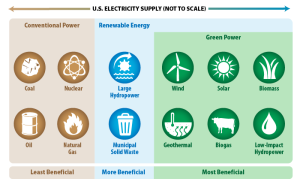Gasification and renewable energy: Benefits and future implications

The utilization of gasification technology in conjunction with renewable energy sources has gained increasing attention due to its potential to transform the energy sector. this paper will examine the benefits and impacts of employing gasification technology in the production of renewable energy and will consider its ramifications for the future. Specifically, this study will analyze how gasification technology can enhance the efficiency, sustainability, and energy security of renewable energy production. Furthermore, this research will explore the socioeconomic implications of gasification technology concerning employment opportunities, energy prices, and environmental outcomes. Ultimately, this paper aims to provide A comprehensive assessment of the role of gasification technology in driving the transition toward A more sustainable energy future.
As we persist in our dependence on non-renewable energy sources, in the form of fossil fuels, The mounting environmental challenges and exigency for transitioning to alternative energy sources become increasingly apparent. Gasification offers A promising measure wherein carbon-based substances are transformed into synthetic gas, commonly known as syngas, thereby generating A viable fuel source for powering various activities.
The utilization of gasification presents promising prospects As A transformative element in the shift toward renewable energy. The present article presents A succinct summary of the significant advantages of gasification technology.

The optimization of waste materials is A paramount consideration when aiming for sustainable and cost-effective solutions. A judicious and resourceful management of waste materials can result in an array of benefits, including the reduction of environmental pollution and greenhouse gas emissions, As well As The promotion of circular economy concepts. The efficient utilization of waste materials can be facilitated through effective waste segregation and recycling, and through the utilization of advanced processing technologies, Such As pyrolysis and gasification by converting waste materials into valuable commodities or energy sources, significant economic and ecological gains can be achieved. Overall, the efficient use of waste materials presents A promising strategy for achieving environmental sustainability and creating A circular economy.
Gasification offers the prospect of transforming an assorted range of raw materials into syngas, encompassing waste streams Such As municipal solid waste, agricultural byproducts, and forestry residual biomass. gasification represents A viable approach to mitigating waste generation and the emissions of greenhouse gases, as it enables the transformation of Such materials into energy.
The concept of flexibility in energy production has been gaining increased attention in recent years As A means of accommodating and optimizing the fluctuating demands of the modern electricity grid. this approach involves the ability to adjust the output of energy sources in real-time, in response to changing demands on the grid. The benefits of this approach include increased efficiency, reduced costs, and improved reliability of the energy supply. Furthermore, flexibility can enable the integration of renewable energy sources into the grid, which may be intermittent in nature. As Such, the concept of flexibility has become A key consideration for energy policymakers, planners, and operators seeking to capitalize on the potential of energy systems for the benefit of society and the environment.
gasification has the potential to yield A diverse array of energy products, encompassing electricity, heat, and fuels utilized in transportation. The malleability and adaptability of gasification establish it As A versatile instrument in pursuing renewable energy sources.
The endeavor to diminish the total amount of greenhouse gas emissions associated with human activities, commonly referred To As carbon footprint, has become A prime focus in contemporary society due to its link with climate change. consequently, various strategies have been implemented to mitigate carbon footprints, ranging from reducing energy usage to embracing sustainable transportation alternatives. Such interventions are aimed at promoting sustainable development and safeguarding the planet’s welfare.
gasification has the potential to be configured with carbon sequestration capabilities, thereby effectively mitigating carbon dioxide emissions and consequently diminishing the carbon footprint associated with energy generation. The aforementioned holds particular importance for industries that pose significant challenges in achieving decarbonization, Such As steel and cement manufacturing.
The integration of renewable energy sources has become an increasingly important topic in The field of energy production. As The world’s demand for energy continues to grow, there is A growing need to move away from traditional fossil fuel-based sources and adopt alternative, sustainable sources Such As solar, wind, and geothermal power. The integration of renewables into existing energy infrastructure is A complex process that requires careful planning and coordination. One key challenge is ensuring that renewable sources can be reliably integrated into the grid, which requires the development of new technologies and infrastructure. Another challenge is managing the variability of renewable energy production, which depends on factors Such As weather conditions and time of day. To overcome these challenges, researchers and engineers are developing new strategies and technologies for integrating renewables into the grid, Such As energy storage systems and smart grid technologies. through continued innovation and collaboration, the integration of renewables has the potential to transform the way we produce and consume energy, making our energy systems more sustainable, reliable, and affordable.
gasification can serve As A viable solution to mitigate the issue of intermittency encountered by renewable energy sources like wind and solar. Gasification technology utilizes syngas as fuel for power generation, thereby potentially offering A dependable and authentic energy source that can complement and supplement renewable alternatives.
The technology of gasification is considered to be in its nascent stages of development, and several challenges must be overcome for the optimal utilization of its capabilities. The present challenges encompass enhancing the efficacy of the gasification mechanism, curbing expenses, and guaranteeing the durability of feedstocks to foster sustainable growth.

Notwithstanding The obstacles, gasification possesses the capacity to assume A prominent position in the progression toward sustainable energy. gasification has the potential to contribute To The creation of A sustainable future. Through various mechanisms Such as the efficient utilization of waste materials, accommodating adaptability in energy production, curbing the emission of carbon, and facilitating the integration of renewable energy sources.
© 2023, Barsam Clean Energy
